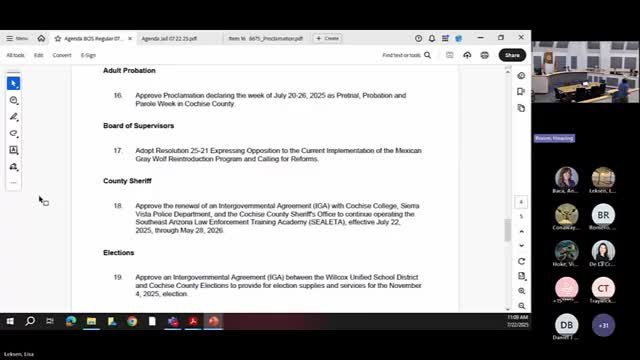During the Board of Supervisors meeting on July 22nd, Cochise County was abuzz with passionate discussions regarding the contentious topic of the Mexican Gray Wolf. Community members gathered to express their views on a resolution that could significantly influence ranching practices and efforts in wildlife conservation.
Allison Morse, a resident who made the trek from the portal area, voiced her opposition to the proposed resolution. She stressed the need for ranchers and endangered wolves to coexist, stating, “We recognize that the wolves have a right to be here, just as farmers believe they do.” She advocated for a balanced approach that honors both agricultural traditions and ecological requirements. Morse pointed out that ranchers are only a portion of the county’s demographic, yet public sentiment seems to be shifting in favor of the wolves, with 32 supporters versus 20 opponents.
Dr. Letris Neals, a seasoned wildlife management expert, echoed Morse’s sentiments and drew parallels between ranching in Namibia and Cochise County. She posited that sustainable ranching can coexist with the predator population, claiming, “Wolves are gold weight and ecologically valuable.” Neals urged the supervisors to lean on scientific evidence rather than bowing to pressure from a vocal minority.
The meeting also featured an emotional appeal from Aurelia, the founder of “She Saves the Seeds.” She emphasized the profound connection between the land and its wildlife, urging supervisors to safeguard Mexican gray wolves for the sake of ecological balance. “Your actions will determine what world we will inherit,” she reminded the board, stressing the urgent nature of these issues for future generations.
As discussions continued, the board faced an escalating demand for transparency regarding public opinions on the resolutions. The diverging views illustrated a passionate yet divided community focused on both the ranching and wildlife sectors, urging the board to postpone decisions until more evidence-based discussions could take place.
The outcomes from the meeting could have lasting implications on how Cochise County balances agricultural interests with wildlife conservation. With community voices growing louder, the board’s forthcoming actions will be pivotal in determining the future of both the land and its inhabitants.







